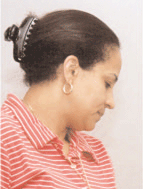|
Making a Difference in Cancer Research
About Making a Difference in Cancer Research
Taking Part in Cancer Research
Influencing Cancer Research
Joining an Institutional Review Board
Federal Government Programs That Welcome Consumer Involvement


"I found out I had cancer 6 years ago, just after my 45th birthday. I
started learning as much as I could about my cancer. I wanted to know about all
my treatment options. I am lucky because my wife's best friend is a nurse. She
told me that for many cancers, some of the best treatments are clinical trials.
I remember I said, 'Are you crazy? I'm not going to be anybody's guinea pig.'
Then she told me, 'Don't close your mind to this before you know all the facts.
Sometimes clinical trials can offer the best treatments available.'
So I found out everything I could about clinical trials. My doctor and I talked
about this together, and she referred me to a trial. After a lot of thought and
talking it over with my family, I decided to sign up. That's how I got my
cancer treatment.
I've been out of treatment for about 4 years now, and so far, things look good.
I am not saying that clinical trials are right for everyone. I'm not even
saying I'm cured. I'm just saying I got informed and learned about all my
options.
I tell everyone that if you want to take an active role in deciding your
treatment, learn about clinical trials and decide if they're right for you. I
help people understand that they're not 'guinea pigs' when they take part in a
trial.
Clinical trials helped me. But more than that, I feel like I am helping others
who may someday get cancer. Maybe my decision to take part in a clinical trial
will help improve treatment for others. Maybe my story will help others find
the treatment they need. I know that my cancer experience is not in vain."
— Chris, colon cancer survivor, 51
Research is the key to improving treatments for cancer. The more people take
part in clinical trials, the faster we can answer important research questions,
leading to better treatment and prevention options for all cancers.
Cancer research takes place at hospitals, universities, government facilities,
and private companies. There are many ways you can get involved with research:
taking part, encouraging others to do so, and helping to influence how research
is done.
Clinical trials are research studies in which people help doctors find ways to
improve cancer care. Each study tries to answer scientific questions and find
better ways to prevent, diagnose, or treat cancer.
Cancer treatment clinical trials test whether a new drug or procedure is
effective, but there are many other kinds of clinical trials and types of
research studies you can take part in. For example, there are:
-
Clinical trials that focus on cancer prevention, cancer screening, and quality
of life.
-
Research studies that ask survivors and their families to fill out surveys or
take part in interviews. These studies focus on understanding more about:
-
The things people do or are exposed to that may affect their health.
-
How cancer and its treatment affect their lives.
-
The medical costs of cancer and its treatment.
Taking part in a research study--after learning everything you need to know
about it--is an important way you can give to others and, perhaps, help
yourself at the same time. You can also make a difference by telling others
about how they can participate in clinical trials.

 "My 13-year old son died of cancer. So, I have a unique viewpoint that I can
share with other parents and scientists. I learned that research is where the
answers are--like how new treatments get to the clinics for kids. I have also
become an advocate and use my skills to help doctors and scientists understand
what parents of children with cancer go through."
"My 13-year old son died of cancer. So, I have a unique viewpoint that I can
share with other parents and scientists. I learned that research is where the
answers are--like how new treatments get to the clinics for kids. I have also
become an advocate and use my skills to help doctors and scientists understand
what parents of children with cancer go through."
— Juana, lost her son to cancer, 53
Doctors and scientists take a lot of time to design a study before the research
can start. They need to decide what topics to research, how the research will
be done, and how it will be funded.
It's not just doctors and scientists in lab coats who need to think about these
issues.
People who have had cancer and others who are concerned about cancer (often
called consumer or patient advocates) are beginning to have a voice in how
research is funded. Consumers bring an important point of view to the research
process. They explain what is really important to people who have cancer. They
also help scientists think about what it is like for patients to take part in
cancer research.
Whether sponsored by a private organization, a state government, or the Federal
Government, cancer research programs must review applications to decide which
projects to fund. For example:
-
Many foundations raise money for cancer research, education, and outreach
programs and then award funds to projects they feel are worthy.
-
Many states, as well as the Federal Government, run programs in which they
award funds to scientists for cancer research.
Many of these programs invite consumers to join committees that help decide
which research gets funded. Consumers can bring a community perspective to
these important decisions. By serving on these committees, consumer reviewers
help advocate for:
-
Innovative research studies that will benefit patients sooner and more
effectively
-
Improved medical care
-
Improved quality of life for patients, survivors, and their families
There are many different programs that seek consumer input into what research
gets funded. (See
Federal Government Programs That Welcome Consumer Involvement; many
organizations listed in
Organizations Where You Can "Make a Difference" also have funding
programs).
Another way you have an influence in research is by joining an institutional
review board (IRB) at your local hospital, cancer center, or university. An IRB
is made up of doctors, nurses, and people from the community. Its job is to
review research studies and make sure they are run in a manner that is safe and
fair. IRB members also look at informed consent documents and make sure they
are easy to understand and have all the information people in the study need to
know.

|
Ways to Get Started-- Cancer Research
If you are interested in cancer research, here are some ways you can get
started. To learn more about clinical trials:
-
Contact the National Cancer Institute (NCI) to find out more about clinical
trials. For example, you can:
-
Learn more about how clinical trials have helped find better treatments for
people with cancer.
-
Find out how you can teach others about participating in these studies.
-
Find out where clinical trials are taking place in your area.
-
Talk to your doctor about clinical trials in your area. Some of these studies
may also be listed in your local newspaper.
|
To learn more about influencing cancer research:
-
Contact the research office at your local hospital, university, or cancer
center. Ask to speak with the researchers to learn more about their work.
-
Learn about research in your community by visiting the NCI Research Portfolio
Web site at:
http://researchportfolio.cancer.gov.
You can search this site by state, institution, or name of researcher.
-
Contact your state's health department and ask about the cancer research
programs it funds. Find out which studies are looking for consumers to get
involved.
-
To find local cancer programs, look in your telephone book under "Departments
of Health" or "Health Departments."
-
Find out about the private foundations in your area that fund cancer research,
and ask if they would like consumer input. (To learn more, go to the list of
cancer organizations in
Organizations Where You Can "Make a Difference".)
-
Call or write the Federal Government programs at the numbers listed on the next
page, and ask for an application to be a consumer or patient representative.
Government Program
|
Description
|
Consumer Advocates in Research and Related Activities (CARRA) NCI
Liaison Activities (LA) Branch
6116 Executive Blvd., 3068A
Bethesda, MD 20892-8324
Tel: 301-594-3194
http://la.cancer.gov/carra
E-mail: liaison@od.nci.nih.gov
|
The Consumer Advocates in Research and Related Activities (CARRA) program
encourages people affected by cancer to provide their viewpoints and ideas
directly to NCI staff so that the NCI can incorporate their perspectives into
its programs and activities. CARRA members represent many different cancer
types, age groups, and ethnic groups from across the nation. In addition to
participating in NCI activities, CARRA members represent the opinions of their
groups and play critical roles as two-way information links between their own
communities and constituencies and the NCI.
CARRA members meet directly with NCI staff. They may:
-
Review proposals during scientific peer review.
-
Participate in meetings about NCI research plans and policies.
-
Develop and review health promotion messages.
|
Clinical Trial Cooperative Group Program
See the Cooperative Group Program link on the Web site by going to , and
following the links on your screen. Or call the National Cancer Institute's
Cancer Information Service at
1-800-4-CANCER to request a fact sheet that lists
cooperative groups.
|
Clinical trials are often conducted through NCI Clinical Trial Cooperative
Groups, which are networks of institutions that jointly carry out large
clinical trials. Members of these groups include:
-
University hospitals
-
Cancer centers
-
Community doctors and community hospitals
There are ten cooperative groups; some focus on type of cancer, others on type
of treatment, and at least one on age of participants. Other groups are
regional or focus on several cancer types.
Cooperative groups seek the input of patients in their committees and working
groups. Some patient advocates may be involved in developing research plans
(called protocols); others may help develop informed consent forms; and others
are involved in advising on policies or priorities. The application process is
different for each cooperative group.
|
Congressionally Directed Medical Research Programs (CDMRP)
Congressionally Directed Medical
Research Programs
ATTN: Consumer Recruitment
1077 Patchel Street
Fort Detrick, MD 21702-5024
Tel: 301-619-7079
http://cdmrp.army.mil
E-mail: cdmrp.consumers@det.
amedd.army.mil
|
Currently, the CDMRP oversees research programs in Breast Cancer, Prostate
Cancer, Ovarian Cancer, and Chronic Myelogenous Leukemia. In these programs,
Consumer Reviewers take part in reviewing research proposals along with
scientists (called "peer review"). Consumer Reviewers:
-
Represent the collective views of survivors, patients, family members, and
persons affected by and at risk for a disease.
-
Read and evaluate research study proposals for relevance to the consumer
community's needs and concerns.
-
Actively participate in the discussions and decisionmaking process of
peer-review panels.
-
Participate equally with scientists as full voting members.
|
After you have worked in cancer research for a while, think about how you liked
this experience. One way is to fill out
Thinking About Your Choices: A Guide.
 Back to Top Back to Top
< Previous Section | Next Section > |